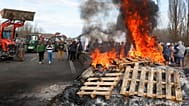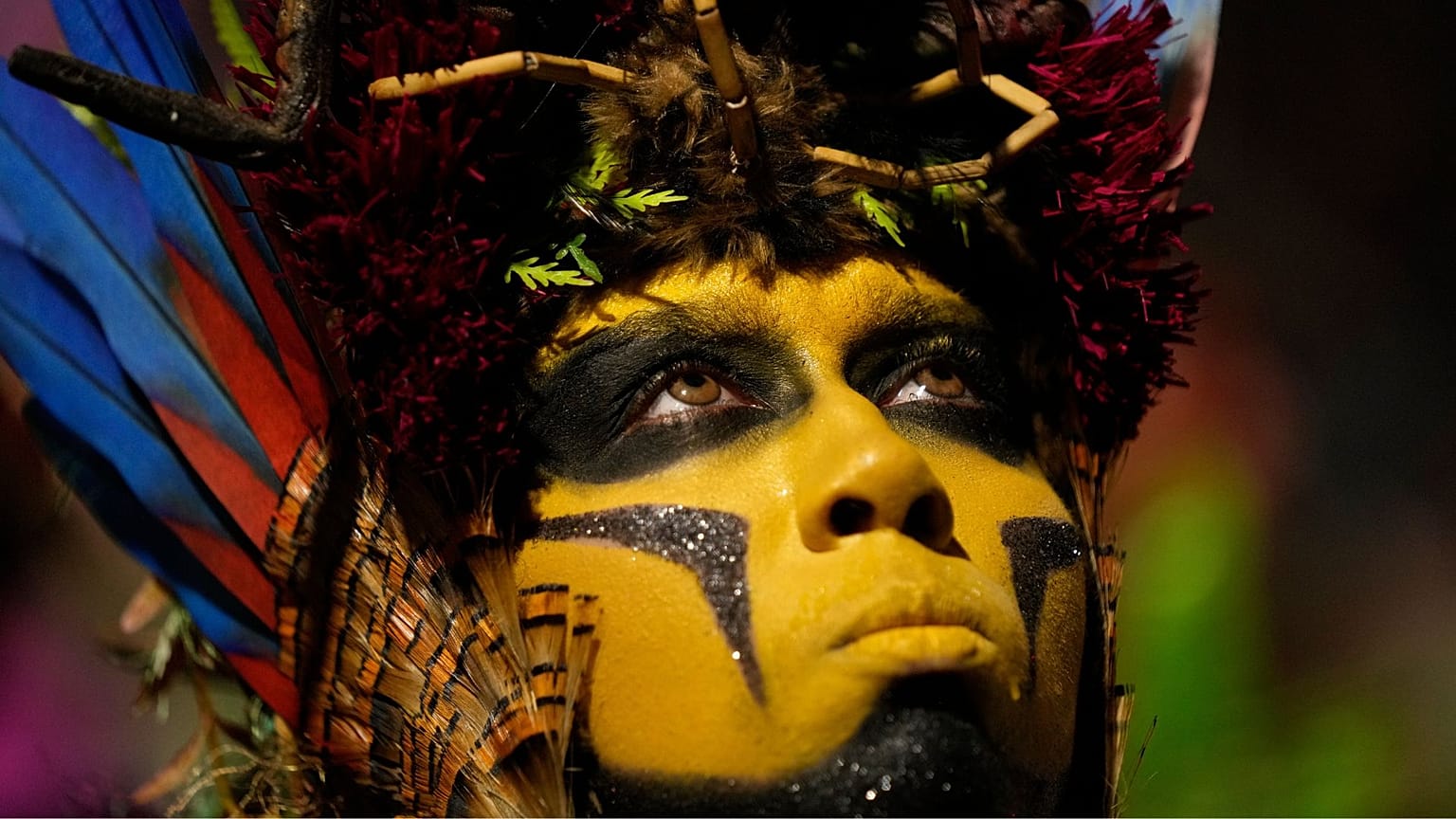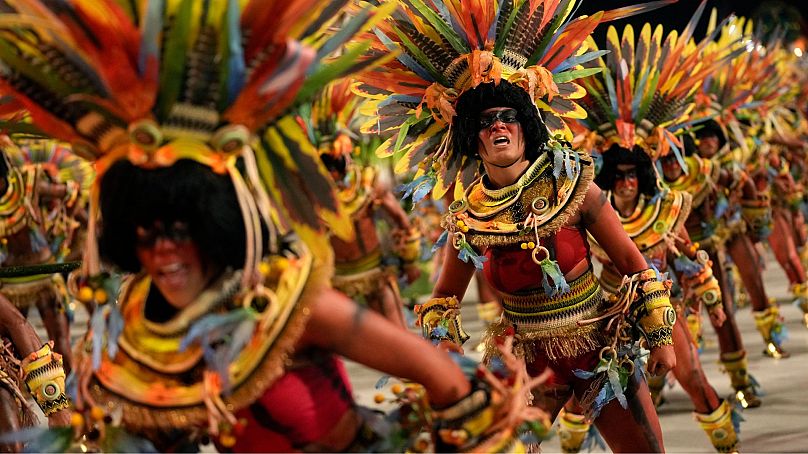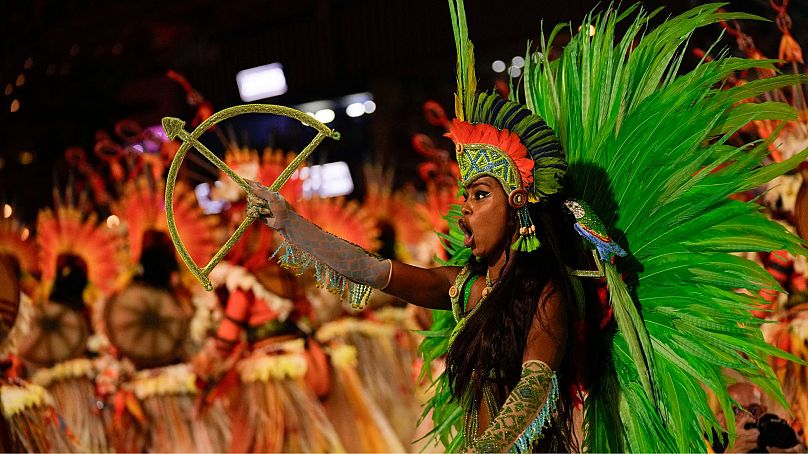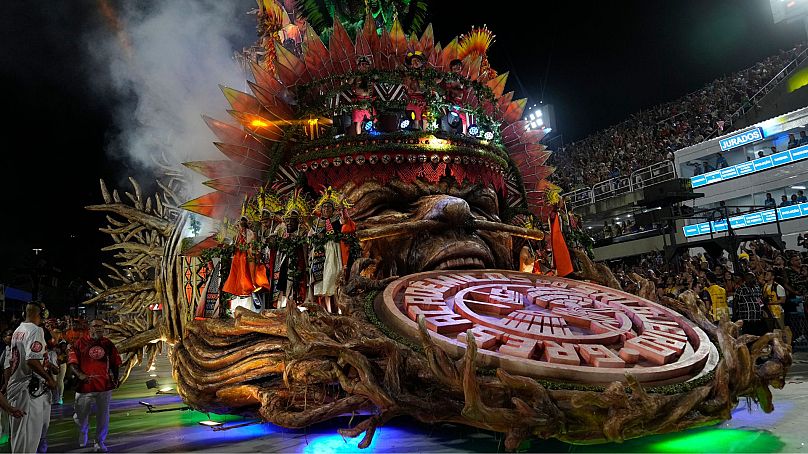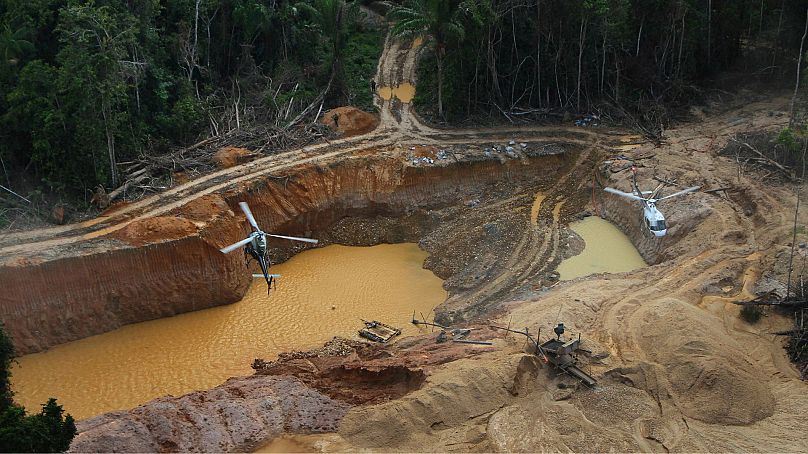Dancers from a samba school call for more protection for the Indigenous Yanonami people, whose lives are threatened by illegal mining.
On Sunday night, Rio de Janeiro surrendered to the festivities of its legendary carnival. The city's Sambadrome was dyed in every possible colour with the parades of samba schools. But one of them brought a very special, and unusual, plea to the show.
Salgueiro's samba school paid tribute to the Yanomami people, the largest Indigenous group in Brazil, and called for a stronger fight against illegal mining on their land.
Their floats showed a severed tree trunk, with a performer playing a Yanomami mother trying to protect her child, and other floats featured massive sculptures of Yanomami people.
The samba school used the parade to draw attention to the devastating effects brought by illegal mining inside Yanomami territory, including widespread river contamination, famine and disease.
The dancers took to Rio's biggest stage alongside percussionists who had ’Miners out’ written on their drums.
“My Salgueiro [the samba school] is the arrow for the people of the forest,” the parade participants sang out as they marched through the Sambadrome, delivering their message to more than 70,000 revellers at the Sambadrome and millions watching live on TV.
Yanomami people denounce illegal mining with samba rhythms
Davi Kopenawa, a Yanomami leader and shaman, advised the samba school on how to remain truthful to his people. He joined the troupe in the parade, along with 13 other Yanomami.
"Ours is a cry for help from Brazil and the world at large. My hope is that the world, upon hearing our call, will put pressure on the Brazilian government to remove all the miners, destroyers of our mother Earth, who are soiling the water and killing fish," said Kopenawa.
The Yanomami leader paraded with feathered armbands and headdress, plus a beaded necklace depicting a jaguar.
Activists call for more efforts from Brazilian authorities
Since Luiz Inácio Lula da Silva was elected as Brazil's president in 2022, he has made efforts to put environmental issues back on the country's agenda.
After predecessor Jair Bolsonaro's controversial mandate, Lula declared a public health emergency for the Yanomami people a year ago.
Some 30,000 Yanomami live in Brazil’s largest Indigenous territory, spanning more than 9 million hectares in the northern area of the Amazon rainforest, along the border with Venezuela.
The Brazilian government sent the armed forces, doctors, nurses and food. Still, over 300 Yanomami died of various causes in 2023, according to the health ministry.
Lula also created a dedicated inter-ministerial task force to fight illegal mining. Government officials say that since the beginning of the operation, areas with illegal mining inside Yanomami territory have dropped 85 per cent and that Yanomamis' health has improved.
But after the operation's initial success, prosecutors, law enforcement and employees of federal environmental agencies say illegal miners are returning.
Jair Schmitt, head of environmental protection at Brazil’s environmental agency Ibama, told news agency Associated Press (AP) that miners have adapted to escape law enforcement and satellite detection by working at night, setting camp under the forest canopy and choosing old mining pits instead of clearing forest to open new ones.
Armed forces questioned in their protection role
The armed forces have been criticised for not being active enough in protecting the Yanomami people.
Lula had said they would play a key role in the fight, providing logistical support and security to public workers and federal agents on the ground who say they increasingly fear for their lives.
But the army, which has three permanent bases inside Yanomami territory, didn't sound the alarm under Bolsonaro.
“There was nearly a massacre of an unprotected population. Why did the army let this happen instead of denouncing it to the federal government or reaching out to the press?" Martins Filho, a professor at the Federal University of Sao Carlos, told the AP. "In a certain way, they were accomplices.”
In a written response to the AP, the army said that illegal mining and the health crisis within the Yanomami territory “are complex issues involving the legal jurisdiction of various government agencies,” and that the army is “always prepared to fulfil its strategic missions.”
That includes providing support to federal agencies through logistical, communication and intelligence activities, such as those being conducted in the Yanomami territory, the statement said.
André Luiz Porreca Ferreira Cunha, a federal prosecutor who oversees cases linked to illegal mining across the western Amazon, said violent attacks of environmental agency Ibama agents and members of the federal police are becoming more frequent, with some cases of attempted murders.
“Some are heavily armed, the health teams are scared. This state of emergency cannot solve the problem. We need something permanent, for all the communities,” Ferreira Cunha said.



